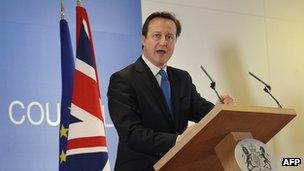UK's widening gap with EU
- Published
- comments

Mr Cameron is renegotiating UK relations with Europe as integration deepens
Europe's leaders gather in Brussels at an unusual time. The markets are becalmed. Sure, the problems in countries like Greece and Spain lie unresolved, but the anxiety is less than it was.
The pause in firefighting is being used to discuss buttressing economic and monetary union., external There are plenty of ideas out there: giving the eurozone a separate budget, making countries in the zone sign binding contracts to control their budgets, setting up the first stage of a banking union.
Much of that is a work in progress and little will be agreed at this summit, but behind the technical details lie grand ambitions for the future.
The German Finance Minister Wolfgang Schaeuble believes the eurozone needs a fiscal union, control at European level of tax and spending.
"We must now take bigger steps," he says, "in the direction of a fiscal union".
He envisages treaty changes and perhaps a convention where this giant leap forward for the EU can be negotiated. The Germans are clear that this would involve a significant transfer of sovereignty to Brussels. Much of this may not happen. The French are unpersuaded and wary of treaty change. Yet it is the direction of travel that matters. Europe - particularly the eurozone - is moving towards closer integration., external
What is widely commented on in European circles is that while Europe integrates further, Britain is loosening its ties. Only this week the government announced it would pull out of more than 100 EU-wide agreements on crime and justice.
A multi-speed Europe?
The future shape of Europe is hard to see, but it appears there could be three different overlapping groupings. Where once the idea of a Europe of different speeds was resisted, now it is accepted.
Charles Grant from the Centre for European Reform , externalforesees three tiers:
An inner circle made up of a tightly meshed eurozone group, which will have largely forfeited national control over its budgets
Tier Two will involve those countries that do not use the euro but expect to one day. They will probably join the banking union and will closely link their economies to the eurozone.
Tier Three will be the old-fashioned EU, where the focus is on the single market, energy, climate change - areas where nations benefit from co-operation but have little desire for closer integration. Britain will be in this third tier, with perhaps a handful of other countries.
The problem for Britain is simply stated: how does it retain its influence from the outer ring? How will the UK ensure that measures agreed to, say on banking union, do not undermine the single market?
British diplomacy in Europe is focused on trying to prevent an inner core making decisions that damage British interests. That is why David Cameron used his veto last December. It is a difficult balancing act.
The UK, for instance, supports a banking union as a means to making the eurozone more secure. It does not want to be part of a banking union itself, but it seeks guarantees that its influence will not be weakened, when 45% of European financial services are based in London.
Europe is changing, and fast. The EU will be a very different construct from what existed in 2009, when the eurozone crisis started. Prime Minister Cameron has said that this new settlement will require "fresh consent", but only after the next election. In parts of Europe this is interpreted as "Great Britain turning away from the EU".
An article in the German magazine Der Spiegel suggests that Chancellor Angela Merkel "has long since come to terms with the fact that there will no longer be a path back to the centre of the union for the British".
The article correctly points out that Mrs Merkel has fought to keep the door open for London. She did not want a Europe of "ins" and "outs". The eurozone crisis has made that a reality, however. Nothing illustrates better the depth of that divide than the eurozone having a separate budget.
Britain's changing role
On personal terms the German chancellor finds David Cameron easy to get on with. The personal chemistry is good. In a phone call earlier this week she recognised that moves towards a banking union must respect the integrity of the single market, which is so important to the British.
In German political circles there is still plenty of goodwill towards Britain, but occasionally patience snaps, like when one German editor told me "we're tired of British opt-outs. Just decide - are you with us or not?"
Nothing, of course, may turn out as expected. It may still prove impossible to keep the eurozone together. In Greece, Spain and Portugal austerity is straining the social contract. A Europe without growth may tire of the constraints of a single currency.
Even so, sooner or later Britain will face immense questions about its place in Europe.
Certainly in Brussels there is a desire to keep Britain in the Union and at the core of decision-making. They are aware that demographics are on the UK's side. By 2050 Britain could not just have the largest population in Europe but its biggest economy. But in these days of European insecurity there is a weariness with British exceptionalism.